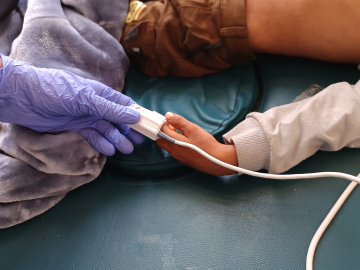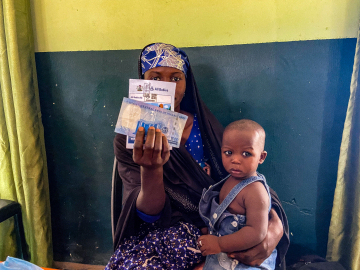Tech Companies Have a Role in Expanding Vaccine Access, Information
Rapidly developed and strikingly effective, COVID-19 vaccines have been game changers in the pandemic—for some. Others are watching from the sidelines because they lack access or are hesitant.
Tech companies have a role to play in expanding vaccine equity, says Nick Clegg, Facebook vice president for Global Affairs.
Facebook, lambasted in recent months for spreading COVID-19 misinformation, launched a multipronged effort today to spark fundraising for COVAX, get reliable information to people, and amplify voices of trusted messengers.
“We want to do our part to help close gaps in vaccination rates by making it easier for people to raise awareness, get trusted information, and contribute directly to vaccine equity,” Clegg, a former deputy prime minister in the UK, told GHN in an emailed Q&A.
Clegg shares details from the equitable vaccines push, vigorously defends Facebook’s efforts to stamp out misinformation, and explains why he’s championed COVAX.
Why is Facebook weighing in with support for vaccine equity? Is there a business case for this?
I think the pandemic has demonstrated how powerful a force Facebook can be for connecting people to accurate, expert information during a global crisis. Since the early days of the pandemic, we worked with the WHO and other public health authorities to get timely and reliable information to people, and we've directed more than 2 billion people to resources from health authorities. It’s a model that we feel has been really effective.
So now we’re doing the same to help people get authoritative information about vaccinations, and that particularly means finding ways to reach people and communities that have lower access to the vaccine, or are perhaps more hesitant to take it.
Skeptics might say this new effort doesn’t undo the harm of vaccine misinformation spread by Facebook. How would you respond?
I think we have to be pretty open and say yes, this is a really difficult issue. Ever since the invention of the printing press people have printed lies and half-truths, but the internet has made it easier to spread deliberately misleading information. Sometimes this is done deliberately by people with an agenda or trying to make money, and sometimes it’s done in ignorance by people with the best of intentions.
Of course, we are going to miss some things we should be acting against. We’re learning and adapting our approach all the time—especially during the pandemic—and we keep an open mind about what more we could and should be doing. When COVID-19 was first declared a public health emergency, we took aggressive steps to limit the spread of misinformation about the virus and connect people with reliable information. This includes removing COVID-19 misinformation that could lead to imminent physical harm like fake preventive measures or claims that the virus doesn’t exist.
In the months since, we’ve continued to update the list of false claims we remove in consultation with health experts. In May 2020, for example, we started removing false claims that discouraged mask wearing. Then in December 2020, when the first vaccines were approved, we started removing false claims about the COVID vaccines when debunked by public health experts. In February, we expanded the list of false claims even further to include additional debunked claims about the coronavirus and vaccines. So far, we’ve removed more than 16 million pieces of content on Facebook and Instagram for violating our COVID-19 and vaccine policies. For other claims we continue to work with our more than 80 fact-checking partners, covering more than 60 languages around the world. When they rate something as false, we add a warning label and reduce its distribution.
Labels are now added on posts that discuss the safety of COVID-19 vaccines that note COVID-19 vaccines go through tests for safety and effectiveness before they’re approved. We’re also labeling all posts about COVID-19 vaccines with a link to our Covid Information Center—and if someone goes to share a labeled post, they see a pop-up with more information so they have the context they need to make informed decisions about what to share.
How will Facebook’s efforts to amplify trusted voices work? Could you give us a specific example?
Our efforts have been focused on connecting people with credible information from leaders and experts. While recent insights show vaccine acceptance in some populations has generally trended up over the past few months, we need to build on that by working with leaders and experts who are trusted voices in those communities to share credible information that really resonates.
For example, we're launching a new partnership with Black-owned social enterprise Broccoli City to host a series of conversations on Facebook between Black influencers, doctors, and scientists on vaccine equity and the overall impact COVID-19. We’re also working with the Kaiser Family Foundation, BlackDoctor.org, and the National Academy of Medicine to amplify campaign content that features Black doctors, nurses, and researchers answering common questions about COVID-19 vaccines.
In the US, we’re using the CDC Vulnerability Index to amplify credible information specifically to people living in lower-vaccination ZIP codes. This way, we’re doing our best to make sure people in these communities will see this content more often and more prominently.
Last year, we had a similar effort where we worked to amplify trusted voices around mask wearing in the US, working with CDC Foundation and others. It reached millions of people—and more importantly, it had an impact: For example, one of the campaigns increased the proportion of people who reported mask wearing being important from 69% to 77%.
How long will these efforts continue, and what does success look like?
As long as it takes. I hope that the world can get back as close to something resembling normality sooner rather than later. No one is safe until everyone is safe.
We committed to helping bring 50 million people a step closer to getting a vaccine. We've already connected over 2 billion people to authoritative COVID-19 information, but today is where the hard work really starts. Each and every shot into an arm takes us one step closer to the end of this crisis.
Within Facebook, you’ve championed support for COVAX. Why was that important to you?
Right now, we have an urgent gap to make up and ensure the global vaccine rollout is fair and equitable.
COVAX’s “Go Give One” campaign is really important, and yes, I’ve championed it within the company, as have many, many others. We’re encouraging people to support it on Facebook during World Immunization Week by chipping in the first $20 to Facebook Fundraisers created for the United Nations Foundation in the United States, United Kingdom, Germany, and Norway, up to $5 million. Supporting COVAX’s work to accelerate the development, production, and equitable access to COVID-19 tests, treatments, and vaccines is one of the best ways I believe we can help get this pandemic under control and reduce the tragic loss of life.
What role can other tech companies play in vaccine equity—and isn’t this more the domain of national governments, the WHO, etc.?
Our Data for Good initiative shares data—in ways that protect the privacy of individuals—with researchers, public health workers, and experts to help with disaster response, health, energy access, and more. By sharing tools that provide real-time insights, we can make decision-making on the ground just a little bit easier and more effective.
Today, we’re providing researchers and public health officials with data and tools to inform disease forecasting, measure the effectiveness of prevention measures and understand attitudes toward COVID-19 vaccines. We’ve learned that health care workers continue to be the most trusted information source for vaccines and that messages with an authoritative and informative approach tended to work better than messages that took an emotional approach.
We want to share these insights and so much more with everyone to ensure that vaccination outreach is equitable and resonates with all communities. I hope that, in doing this, we can create a blueprint for the way tech can help the global response to future crises.
Ed. Note: Facebook has supported the promotion on its platform of COVID-19 content from the Johns Hopkins Bloomberg School of Public Health, which publishes Global Health NOW.
This interview has been edited for length and clarity.
Join the 50,000+ subscribers in 170+ countries who rely on Global Health NOW summaries and exclusive articles for the latest public health news. Sign up for our free weekday newsletter, and please share the link with friends and colleagues.
Older adults in Quito, Ecuador receive their first dose of the Sinovac vaccine yesterday. Image: Rafael Rodriguez/NurPhoto via Getty Images





